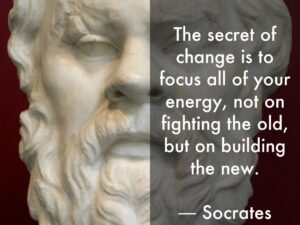
Think: Five years ago, I spoke to one of America’s largest diabetes/dialysis treatment companies. In my presentation, I discussed the startling advances being made in using stem cells to treat diabetes. At one point, a senior executive at the company openly dismissed my presentation by saying “these advances won’t be here for another 50 or 75 years.” Well, the future sometimes as a way of arriving sooner than expected. I wish I could share this article–Stem cells reverse woman’s diabetes–a world first–with the senior executive. Alas, he is no longer with the company. (In another remarkable healthcare-related advance, check out this article: “World-first therapy using donor cells sends auto-immune diseases into remission.”
Think Better: Seth Godin had a good post this week entitled “Facing the Future.” I encourage everyone to give it a read (it’ll take less than a minute). Here’s a quick overview: There are 4 ways to deal with the future: 1) Deny it; 2) Give Up; 3) Try to control it; or 4) Respond. Only one of these is a realistic and practical option.
Think Ambiguously: There is good news, bad news and really bad news. The good news is that advances in artificial intelligence continue to get better. As this article explains, you can now drop your notes and audio files into Google’s latest software and it will create an informative podcast that can help summarize your notes. This will be a great aid in helping students learn complex subjects. The bad news is that AI still “hallucinates” and has various biases. In other words, AI still has problems. The really bad news is that nefarious actors will use the software to create even more realistic podcasts to help disseminate misinformation and disinformation. As I’ve said before, AI is breaking the Internet by inundating it with bad information. The same will be true of podcasts. Please do your due diligence before listening to any podcast. (P.S. Here is a podcast I know you can trust. I was recently a guest on fellow futurist Ross Dawson’s podcast “Amplifying Cognition.” In it, we discuss unlearning, creativity, and the need to be good ancestors.)
Think Harder: AI generated images can now teach robots how to act. People often “miss” the future because they don’t understand how advances in one area of technology help speed up development in another unrelated field. This article explains how AI is making robots better and smarter.
Think Smarter: Want to think smarter? Try thinking like a scientist.
Afterthought: “The only way to make sense out of change is to plunge into it, move with it, and join the dance.” – Alan Watts
